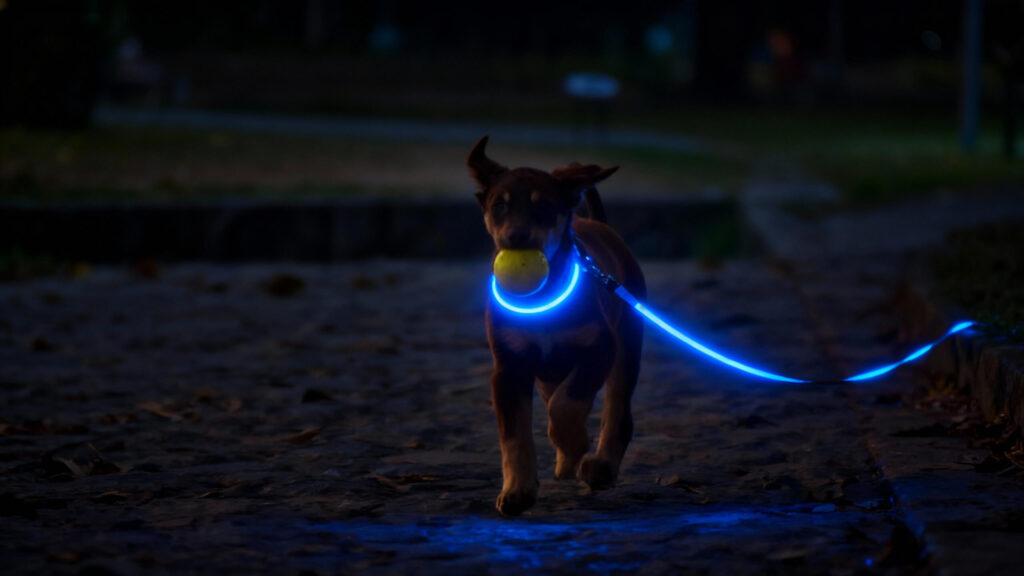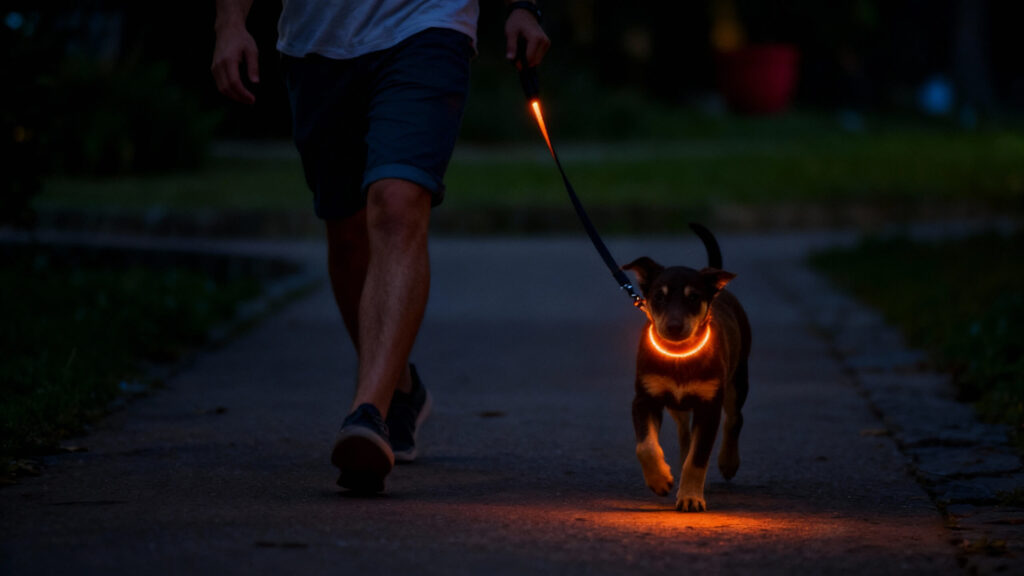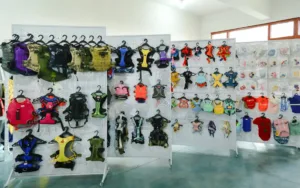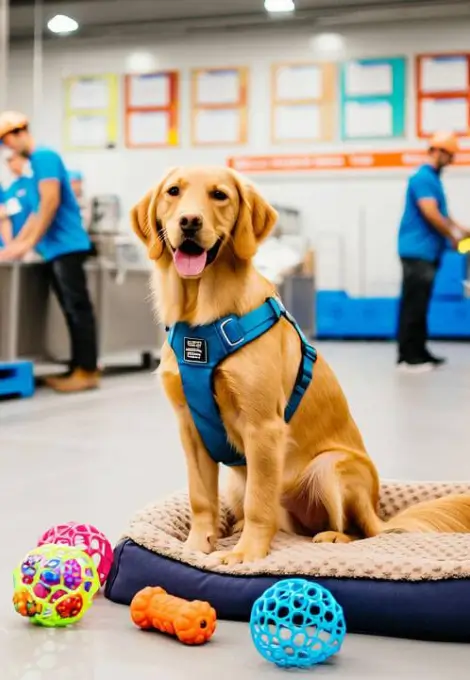Can an LED or reflective dog leash truly keep your dog safe?
In Europe, North America and high-latitude regions, the early sunset and low light conditions lasting for several months each year make “night dog walking” a daily routine for most dog owners. But what follows is a major issue that has been repeatedly verified and is sufficient to affect security:
Are dogs really conspicuous in the dark?
In the product tests we participated in, multiple professional scenarios (wetlands, suburban roads without street lamps, and light fog environments) have repeatedly demonstrated one thing – traditional reflective traction ropes are far from sufficient to provide the safety visibility required in winter.
And this is precisely the fundamental reason why LED light-emitting traction ropes are beginning to become mainstream.

Why is visibility at Night more important Than You Think?
After interviewing several European professional dog trainers and researchers of dog walking behavior at night, we found that:
Whether it’s a large or small dog, the core of night risks does not lie in whether they are obedient, but in whether others can spot your dog in time.
This is especially evident in the following scenarios:
- After the rain, the wet road → the reflection on the ground makes it more difficult to distinguish the dog’s outline
- No street lamp path → The dog’s black back completely disappears
- Urban light pollution areas → Backlighting makes reflective materials almost ineffective
- Vehicles in the suburbs travel at high speeds → the driver’s reaction time is extremely short
In our on-site records, a common reflective traction rope was used in the absence of external light sources (visible distance less than 5 meters); The average visible distance of the LED light-emitting traction rope is 300 to 1,000 meters.
This means that the moment the LED leash lights up, your dog becomes indispensable in the eyes of others.
Why is it that a seemingly simple traction rope is actually so hard to choose?
Many users’ first reaction is: It’s fine as long as it’s lit!
However, once it comes to the actual test, it will be found that the real situation is much more complicated than imagined.
The following are the common failure points we have encountered in the reviews of over 20 products:
× The brightness is concentrated on the handle, while the rope body is not bright
This leads to only you being able to see the light, while others cannot see the dog’s position.
× The visible Angle is limited (not 360°)
The side is bright and the back is dark. It will completely fail when the dog turns around or the rope twists.
× The battery life is insufficient
If you walk your dog twice a day in winter, it will run out of power in one night.
× The waterproof grade is low
Snow, wet grass and rainy days directly cause short circuits or brightness attenuation.
× The light is uneven and it is actually much darker than the photo
It is precisely because LED products vary greatly that users are often confused by their appearance and eventually choose versions that are not safe enough.

How to Choose? From a professional testing perspective, we’ll tell you the five most important indicators
Combining the experience of dog trainers, night running coaches and our own testing, we have summarized a set of industry-recognized evaluation criteria:
1. Whether the active light source covers the entire traction rope
Only when the entire rope is illuminated can true 360° all-round visibility be provided.
2. The visible distance should be at least 300 meters
For areas where vehicles travel at high speeds at night, the farther the visible distance, the safer it is.
For example: Medium and large-sized dogs such as huskies and golden Retrievers that are prone to sudden acceleration/walking dogs on rural roads, park running tracks without street lamps.
LED traction ropes far outperform reflective materials in these scenarios.
3. Battery life ≥ 5 hours
Take your dog for a walk twice a day in winter. Any product with a battery life of less than 5 hours is not reliable enough.
4. Waterproof grade
Suitable for: snowy, light rain, dogs treading on wet grass, and misty mornings.
Poor waterproofing of electronic products is the most common cause of failure for LED products.
5. Whether it has multiple light effect modes
Different scenarios require different lighting:
- Always-on mode: Most stable on dark paths
- Slow flash mode: Conspicuous but not dazzling on urban roads
- Flash mode: The effect is prominent in the high-speed area of the vehicle
Professional dog trainers generally believe that the flashing mode is the state that is most easily identified from a distance.
What to Choose? A product direction with high recognition within the industry and stable long-term performance
After extensive market research, the following brands of LED light-emitting pet products have performed relatively maturely in the North American and European markets:
Illumiseen: Flexible optical fiber + long battery life, it is a common choice for many runners and dog walkers at night.
Blazin ‘Safety: Strong brightness, long visible distance, suitable for large dogs or users who often walk around in the suburbs.
Nite Ize (NiteDog Series) : Excellent waterproof performance, suitable for use in snow and rainy seasons.
In addition, a new trend of safety systems is gradually emerging in the industry: LED collar + LED shoulder strap + LED traction rope = three-dimensional luminous safety system
For instance, there are many dog breeds that are prone to darkening and becoming invisible, such as Shiba Inus, Dobermans, Black Labradors, and sheepdogs
Visibility increased by more than 300% after using the entire set of luminescent equipment.
Conclusion: LED is not brighter, but safer
Let’s go back to the initial question of the article:
Why is it necessary to consider an LED light-emitting leash when walking dogs at night in winter?
Because of extensive testing and verification through actual cases, we can say with certainty that:
The LED light-emitting traction rope is an active safety device, while the reflective traction rope only provides passive protection.
At critical moments, the former can make your dog visible, while the latter is only effective if others see you first.
For most dog owners, this gap is sufficient to determine safety.







